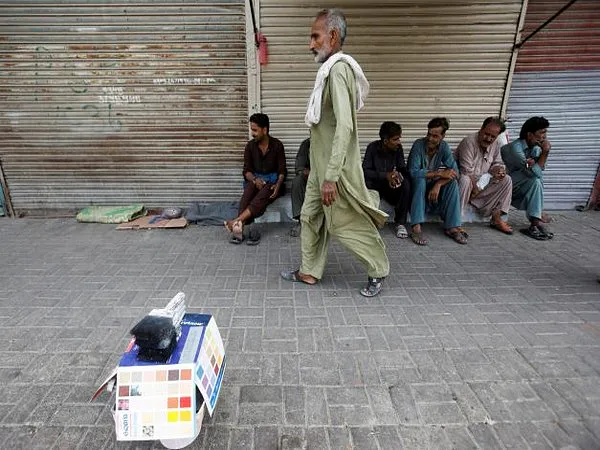International investors are losing confidence in Pakistan amid a deteriorating economy and intensified political uncertainty.
There are also doubts about the efficacy of Pakistan’s policy framework and responses to tackle the deepening economic crisis, especially the Central Bank’s monetary tightening amid steep depreciation in the Pakistani rupee (PKR), reported US-based publication Financial Post.
Global investors are fast losing confidence in Pakistan as the country is struggling with soaring commodity prices and tighter credit conditions. It is apprehended that the Pak economy may follow the Sri Lankan footprints and drift towards a foreign debt default.
With its foreign exchange reserves dwindling to USD 7.83 billion on August 5, enough for just 1.12 months according to the State Bank of Pakistan (SBP), a liquidity crisis in Pakistan is expected.
Moreover, in recent weeks, major credit rating agencies namely, Fitch, Moody’s and S&P, all have downgraded Pakistan’s outlook to the negative or ‘junk’ category.
This has eroded investors’ confidence. The smaller discount on the country’s bonds is another indicator of the deteriorating health of the economy. Meanwhile, the Pak currency, PKRs, has tumbled more than 15 per cent over the previous three months, reported Financial Post.
Prominent businessmen and around 50 representatives from the Pak business and industrial community at a recent emergency meeting have demanded Prime Minister Shehbaz Sharif declare an economic emergency and take urgent steps to avoid a Sri Lanka-like situation.
Pakistan Businesses Forum Senior Vice President Muhammad Riaz Khattak stated that “Pakistan is going through a severe economic crisis and unfortunately mainstream political parties have not come up with any effective measures to save the economy.”
Islamabad is facing unprecedented upward pressure in the price level. It is fast losing policy options, yet it opted for a dear money policy to tame inflation.
It increased the benchmark interest rate to 15 percent in order to save the economy from further troubles that might make all businesses unviable, particularly affecting exports, reported Financial Post.
The surge in global energy and food prices since the Russia-Ukraine conflict had fed inflation and widened the Pak trade deficit further squeezing the forex reserves.
Added to this is the recent petrol price hike of PRs. 6.72 per litre, which would further push up the inflation which was around 25 per cent in the month of July.
Pakistan has virtually gone bankrupt. Finance Minister Miftah Ismail informed that Pakistan’s imports last year stood at USD 80 billion against its exports of USD 31 billion. Islamabad’s finances are in shambles – both on external and internal fronts as the country is facing increasing fiscal and current account deficits. Pak has no option, but to seek loans, reported Financial Post.
In this regard, the Finance Minister disclosed that he felt “ashamed” when he had to meet the ministers of other countries and “ask them for loans”. He acknowledged that the country could hardly sell any product to the outside world and was heavily dependent on imports.
While Pakistan has drawn on bilateral assistance from friendly countries in previous crises, analysts stated it would falter in its push to regain its monetary footing because of political instability, which attracted the attention of overseas investors.
In spite of the IMF loan, Pak needs to make arrangements for USD 4 billion from other sources to meet external debt obligation of over USD 15 billion in the FY 2022-23.
According to the SBP, the year-on-year growth in debt and liabilities was 24.8 per cent. Pak debt has been among the worst performing this year so far, signalling investors’ concern over the pressures on the economy.
Another concern for investors is the deteriorating security scenario in Pakistan. The Overseas Investors Chamber of Commerce and Industry (OICCI), an industry body in Pakistan, informed interior minister Sanaullah Khan that 70 per cent of the CEOs whose firms operate in Pakistan hold security among their top concerns.
Multinationals operating in Pakistan are worried and they think the deteriorating security situation in the country will further deteriorate and worsen the business climate.
OICCI’s Security Survey 2022 revealed that the confidence businesses hold in Pakistan’s law enforcement agencies has been undermined by the rising crime rate, reported Financial Post.
Zubair Chhaya, CEO of Kite Ltd noted that unemployment and poverty had increased thefts and other crimes, which have made the process of conducting business difficult. The easy availability of drugs and weapons also remains one of the major reasons for the rise in street crime in Karachi.
Businesses in Pakistan are also dealing with a rising number of land grabbing incidents. Muhammad Idrees, President of Karachi Chamber of Commerce and Industry held that “whether public or private property, precious land is fearlessly being taken over by some highly organised and powerful groups of land grabbers.”
Pakistan is struggling to come out of the current account deficit, for which the government has drastically reduced imports. However, the massive import cuts slashed the economy and would result in large job cuts in the industrial sector.
Thus, Islamabad has entered the trap of a vicious circle of low levels of exports, high current account deficit, lack of investments, low productivity and finally leading to a forex crisis.
Moreover, the IMF recently forecasted an increasingly gloomy and uncertain outlook for the global economy as the world is reeling under the adverse effects of the pandemic and the ongoing Russia-Ukraine conflict.

